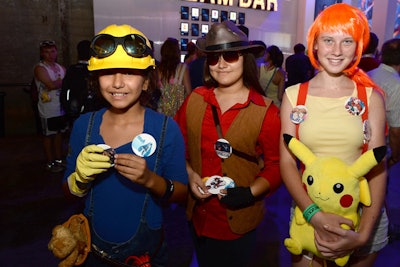
"Super fan" is a marketing buzzword of late. While the idea of engaging an audience that is already passionate about your brand or product isn’t new, social media has made fans even more valuable: They’re easier to find, they’re easier to reach, and they have more tools to share their love for a brand with their friends.
“Super fans are very important to us, because they're very passionate about our programs,” says Linda Schupack, executive vice president of marketing for AMC. While pushing shows like Mad Men, Breaking Bad, and The Walking Dead, AMC develops promotions around their hardcore viewers and looks for ways to compel them to share their passion with others.
Although the concept of super fans might bring to mind people who camp out overnight dressed as their favorite comic book characters—and there are lessons to learn from events that engage those folks—other types of brands are creating events for fans, too. For example, Pepsi rewarded selected Beyoncé fans who created videos based on the singer's latest commercial with the chance to appear in a video made with her choreographer, as well as a trip to her concert in Brooklyn. Here’s a look at why marketers are such fans of—sorry—their brands’ fans.
1. They're already customers
The 80-20 rule—also known as the Pareto principle—states that 80 percent of a company’s sales comes from 20 percent of its customers. Charlie Horsey, C.E.O. of New York-based marketing agency MKTG, which specializes in microtargeting, says new research suggests that many brands actually rely on even smaller percentages of their customers for the vast majority of their sales. So why not focus your marketing efforts on retaining your best customers, and getting more out of them?
2. They'll tell their friends
People who love a brand now have so many easy ways to communicate that love to others—and that’s what’s driving much of the attention marketers are giving super fans. "Social has a lot to do with that—the fact that everyone has an opinion and can let that opinion be known at any time,” says Jeff Kaplan, vice president of global events and brand activation for Discovery Communications. He has designed events around the fans of shows like the Discovery Channel’s Deadliest Catch.
AMC has created digital tools like a “Mad Men Yourself” game where Don Draper fans could generate ’60s-style character illustrations to use on social media platforms. The promotion was so popular—you’ve probably seen friends with AMC-made avatars on Facebook—that the network made a “Dead Yourself” game for The Walking Dead. "We're turning fans into evangelists,” Schupack says.
3. They can be easy to find
If people are really passionate about something, they’re probably already gathering online with fellow fans. Lance Fensterman, global vice president of ReedPOP, the division of Reed Exhibitions that produces eight fan-focused events, including New York Comic Con, says he designs shows around groups that have already expressed their interest in talking about a shared passion. “We look for communities that exist in online forums, and we're giving them a live way to connect,” he says.
These existing communities also make super fans affordable to reach. "They'll find you in a lot of instances,” says Horsey of MKTG.
4. They're easy to impress (if you do it right)
If people are already fans of your brand or product, you don’t have to dream up ways to entice them to be interested in what you’re selling. You just have to find opportunities to give them deeper experiences. Often that means taking advantage of existing properties or content, or piggybacking on events that you’re already doing.
When Discovery Networks had already booked some of the ship captains from the reality show Deadliest Catch to appear on a panel at South by Southwest earlier this year, Kaplan decided to do a fan event with them, too. His thinking was, he says, "They're already in Austin, they're probably going to go out for a beer anyway.” So Discovery hosted a party with bands at the famous barbecue joint Stubbs. More than 10,000 people signed up, and Discovery let in the first 3,000 fans who showed up.
5. They generate content
At a time when many marketers are looking for content to use on brand Web sites and social media platforms, fans often get excited about creating videos, graphics, and testimonials about their relationships with their favorite brands—all of which can feel more compelling and authentic than content created by marketers.
When Captain Phil Harris, one of the subjects of Deadliest Catch, died in 2010, Discovery organized a memorial service for him the day before CatchCon, a free fan event the network produces for the show. The next day, Discovery brought photo booths to CatchCon, where fans could record tribute videos for Harris’s family. Discovery played some of these on the show itself and used them as DVD extras, as well.
6. They give feedback
"There's a lot of value a consumer can bring beyond purchasing," says Horsey. Super fans who are passionate about a product are often very open with feedback that can help shape the brand's future. One of his clients, a consumer goods giant, developed a marketing campaign around a product benefit that its customers raved about but the marketing team had overlooked.
"As marketers we now have a chance to be great listeners,” says Colleen Mohan, senior vice president of brand marketing at USA Network, who produces live and on-air events based around fans of shows like a fan appreciation day for the show Psych. “We don't have to rely on assumptions.”



















